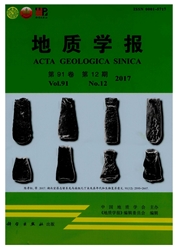

 中文摘要:
中文摘要:
本文开展了在25~150℃和25~100MPa同时升温和升压条件下,鄂尔多斯盆地中煤阶煤岩变形实验研究。结果表明,25℃/25MPa条件下煤岩强度显著低于其他温度和压力条件下煤岩的强度。在实验变形条件下,煤岩主体的变形表现以破裂与微破裂作用为主。不同温度和压力条件下的煤岩变形特点表现出一定的差异。随着温度和压力的降低,煤岩样品破裂的延伸逐渐减小,破裂发育的透人性逐渐升高。变形煤岩样品中破裂的发育往往定向性较强,发育相对较为均匀。随着应变的增加,破裂多扩展为较大的规模。伴随天然煤降温、降压过程,导致煤岩从韧性向脆性的转变,在转变的早期和中期,大量煤层气将解吸储集于尚未贯通的密集微裂隙内,随着温压的缓慢降低,煤岩储集性和渗透性在变好,较为适宜煤层气的运移与保存。而在转变的后期,煤岩形成贯穿性破裂系,造成煤层气的散失,可能成为演化程度和孔隙度低的煤岩吸附煤层气能力弱的主要原因。
 英文摘要:
英文摘要:
Under the 25~150℃ and 25~100 MPa at the simultaneous heating-up and pressure-rising conditions, the deformation experimental results of middle rank coal from Ordos Basin show that the strength of 25 ℃/25MPa condition is much lower than the strength of coal-rock under other p-t conditions. Under experimental deformation conditions, crack and microcrack are the primary characteristics of the deformation of the coal and rock performance. The characteristics of deformation of coal-rock are diverse under different p-t conditions. Along with the decrease of p-t, the extension of crack of coal samples decreases gradually coupled with the penetration of crack increasing. The developing of crack in deformation coal sample is equable comparatively and has directed apparently. The extension of crack has a large scale along with the increase of strain. The decrease of p-t of natural coal leads to the transformation from toughness to brittleness. A mass of coaled methane desorbs and reserves in the unthread microcrack during the early and middle stage of transformation reservoir. The penetration and reservoir of coal rock become superior along with the slow decrease of p-t, which leads to convenient transportation and preservation of coaled methane. However, coal rock forms the breakdown of cross-cutting during the late stage of transformation, which leads to losing of coaled methane. This may become the main reason that decreases the adsorption of coaled methane with low level of evolution and porosity.
 同期刊论文项目
同期刊论文项目
 同项目期刊论文
同项目期刊论文
 期刊信息
期刊信息
